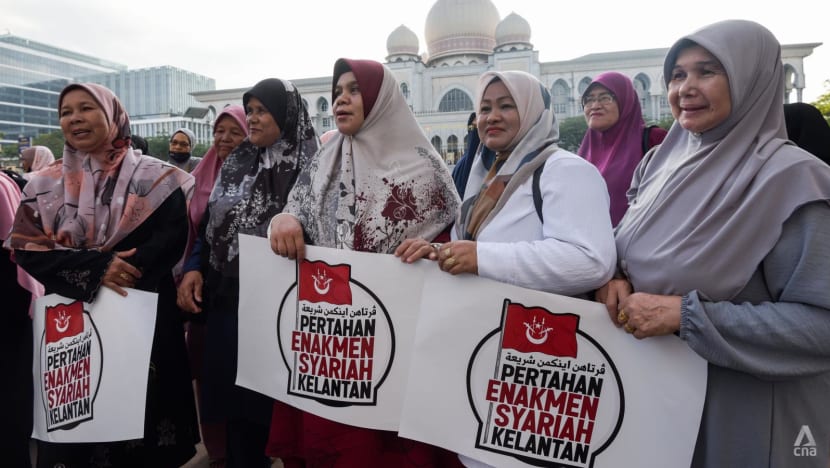Political Islam: Syariah-inspired laws in some parts of Malaysia, Indonesia worry non-Muslims

“In a way, PAS is just playing a game of reinforcing their brand at the end of the day. They know that you know they cannot win because they cannot override the Federal Constitution.
(CNA) – Ms Hasyimah Ayuni has only recently taken an interest in Islam outside the mosque.
The youngest of seven siblings, Ms Hasyimah, who is pursuing a masters degree in environmental health at a university in Malaysia’s Klang Valley, now believes that it is her duty to live in accordance with Islamic principles.
This came about following a court case that challenged the validity of several Syariah laws in the eastern state of Kelantan in February.
Ms Hasyimah told CNA that as Malaysia has a Muslim majority, it was logical that laws for Muslims be given priority over other laws.
She also wants Malaysia to use Syariah laws instead of the common law system being used today.
“As a Muslim, you have laws in your religion that God told you to follow but your country asks you to follow (their) laws, some which are based on Western sources (and) differ from your religion. Wouldn’t you feel angry and sad?” she said, adding that Islam covers all aspects of life.
She believes Syariah laws are the best set of laws that would guarantee the wellbeing of both Muslims and non-Muslims alike.
“This is because the laws are based on legal sources for Muslims such as the Quran (Islam’s holy book),” she said.
According to a study by the Pew Research Center in 2022, most Muslims in both Malaysia and neighbouring Indonesia favoured making Syariah the official law of the land.
The results of the study, which were released in September last year, said that 86 per cent of Malaysian Muslims supported using Syariah as the official law of the land, while 64 per cent of Indonesian Muslims supported the idea.
But communities in the two countries are debating whether these regulations should apply to all, or if Islam’s influence could impact diversity and social freedoms.
According to the Pew Research Center, Syariah, or Islamic law, offers moral and legal guidance for nearly all aspects of life – from marriage and divorce, to inheritance and contracts, to criminal punishments.
About 63.5 per cent of Malaysians are Muslims, according to official statistics.
Political analyst Azmi Hassan of the Nusantara Strategic Academy said most Muslims in Malaysia would say that Syariah law should be used to govern them, and this was regardless of where they come from or their status.
“The belief is there in general. Syariah laws are considered to be the ultimate in governance and Muslims believe them to be the best laws compared to whatever other laws that are being practised,” he said.

‘BLACK FRIDAY’: PROTESTS AGAINST COURT DECISION CHALLENGING SYARIAH LAWS
The issue of Syariah law recently made headline news in Malaysia after the country’s top court declared on Feb 9 that more than a dozen Islamic laws enacted by the state of Kelantan were unconstitutional, following a 2022 challenge by lawyer Nik Elin Zurina Nik Abdul Rashid and her daughter Tengku Yasmin Nastasha Tengku Abdul Rahman.
A nine-member Federal Court bench, in an 8-1 decision, declared 16 laws in Kelantan’s Syariah criminal code “void and invalid”, including provisions criminalising sodomy, incest, gambling, sexual harassment, and desecrating places of worship.
Malaysia has a dual-track legal system with Islamic criminal and family laws applicable to Muslims running alongside secular laws. Islamic laws are enacted by state legislatures while secular laws are passed by Malaysia’s parliament.
Chief Justice Tengku Maimun Tuan Mat who delivered the majority judgement said that the Kelantan state had no power to enact the laws, as the subject matter was covered under parliament’s law-making powers.
There are altogether 68 sections in the Kelantan Syariah criminal code, out of which 52 sections are still considered to be constitutional.
The decision sparked uproar among some conservative Muslim groups, who claimed that the challenge would undermine Islam or the Syariah courts in Malaysia.

The Islamist party Parti Se-Islam Malaysia (PAS) led the loudest protests against the court decision, claiming that it was a “Black Friday” for the country.
PAS has ruled Kelantan since 1990.
“When one Syariah law in one state is cancelled, it also affects the same laws in other states, 14 more states are in a very dangerous and critical situation.
“This is not a small matter, defending Syariah means defending the institution of the King who is the head of the State’s Islamic Religion,” PAS secretary-general Takiyuddin Hassan was quoted as saying by the Malay Mail on Feb 9.
In an interview with CNA, PAS working committee member Muhammad Khalil Abdul Hadi said the party’s efforts to empower Syariah in Malaysia have been consistent since its formation in the 1950s.
“It’s not about politics but about principles. It’s not just an issue for PAS members, but an issue for all Muslims based on the principles of our country. In the Federal Constitution, rights are given to Islam in many aspects, such as Syariah, marriage, and education.
“It’s not at the level we want now but we will always work hard to empower it and we will fight anyone who wishes to sideline it,” said Dr Muhammad Khalil, who is also the eldest son of PAS president Abdul Hadi Awang.

PART OF POLITICAL GAMES: ANALYSTS
Professor James Chin, director of the Asia Institute at the University of Tasmania, said that PAS’ doubling down on the Syariah laws in Kelantan was part of the party’s political game, showing the people that they stood for Islamic supremacy.
He said the party knew it couldn’t pass any laws that contravened the Federal Constitution and that it needed the support of the royalty to make it a reality.
“In a way, PAS is just playing a game of reinforcing their brand at the end of the day. They know that you know they cannot win because they cannot override the Federal Constitution.
“Secondly, a lot of these things actually require the support of the Sultans in order to make it a reality. To me, it’s all about games rather than reality,” he said.
He, however, added that the subject scared a lot of the middle class in Malaysia, especially the non-Muslims, because many of them did not understand how the system works.
Senior Fellow and Coordinator at the Regional Social and Cultural Studies Programme, ISEAS-Yusof Ishak Institute, Norshahril Saat, said that PAS had to be consistent to build on its support base, and it was using identity politics to do so.
“In order to retain its support base, it has to paint the picture that the current government is not doing enough to protect Syariah laws and this has been consistent with PAS’ struggle in the past,” he said.

